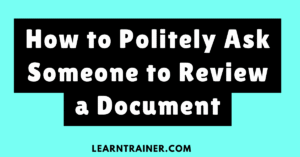Have you ever been in a conversation where you’re sharing something whether an opinion, a suggestion, or just some random fact and someone snaps back with a blunt “Did I ask?” It’s one of those phrases that immediately cuts the air and makes you rethink your entire social strategy.
Whether you’ve been on the receiving end or have said it yourself, it’s important to know how to handle this kind of moment with grace, humor, or even assertiveness.
In this post, we’ll dive into the phrase “Did I ask?” why people say it, the most effective ways to respond, and how to prevent similar awkward situations from happening in the future.
We’ll also go over a few examples, common mistakes to avoid, and offer a personal take on how I deal with such encounters.
Why Do People Say “Did I Ask?”
Before we get into how to respond, it’s crucial to understand why someone might say “Did I ask?” This will help you tailor your response appropriately. While it might seem rude or dismissive, there are a few different motivations behind the phrase.
a) Disinterest or Boredom
Most often, “Did I ask?” comes from a place of disinterest. The person may not be engaged in the conversation or might have had no desire to hear what you were about to say. It’s an immediate way to shut down whatever you were sharing.
b) Annoyance or Irritation
Sometimes, people use this phrase when they feel frustrated, annoyed, or overwhelmed by unsolicited advice or comments. This could be because they weren’t in the mood for a lengthy discussion or just didn’t ask for your input.
c) Power Play
Another reason could be that the person is trying to dominate the conversation or establish control. Saying “Did I ask?” is a way of asserting themselves and dismissing the value of your input, usually because they want to steer the conversation in their direction.
d) Lack of Social Awareness
Occasionally, someone might not even realize how rude they sound when saying this. They could be socially unaware or just lacking empathy in that moment.
Effective Responses to “Did I Ask?”
Now that we understand the reasons behind the phrase, let’s explore how to respond when someone says, “Did I ask?” Below are a few tactics, ranging from playful and light-hearted to assertive and firm.
a) The Casual, Nonchalant Response
If you want to brush it off with grace and continue the conversation without making a big deal out of it, a casual response can work wonders.
- Example 1: “Nope, you didn’t! I just thought I’d throw it out there.”
- Example 2: “Fair point! I just wanted to share my thoughts for a second.”
This approach doesn’t escalate the situation and keeps things light, allowing you to avoid tension without being dismissive.
b) Humor as a Defense Mechanism
Humor is one of the best ways to handle awkward situations. It can diffuse tension and show that you don’t take yourself too seriously. When someone says “Did I ask?” a witty or light-hearted comeback can make both of you laugh and move on.
- Example 1: “Haha, fair enough! Just trying to be a fountain of knowledge over here.”
- Example 2: “Nope, didn’t ask, but you got a free opinion anyway.”
Humor can ease the sting of the comment and turn the awkwardness into a playful exchange.
c) The Assertive Response
If you want to stand your ground and make it clear that you deserve to express your thoughts, you can respond assertively. This response is ideal when you feel that the person’s comment was rude or unnecessarily dismissive.
- Example 1: “I understand you didn’t ask, but I thought it might be useful. If not, we can move on.”
- Example 2: “I get it, you didn’t ask. But I thought sharing that might help the conversation.”
This approach establishes your right to contribute while also showing that you’re open to letting go of the topic if they prefer to move on.
d) The Direct Confrontation Response
If the situation warrants it, you may feel the need to confront the person directly. This is particularly useful if the tone was disrespectful or meant to belittle your input. However, this response should be used sparingly, as it can escalate the situation if not done tactfully.
- Example 1: “I understand that you didn’t ask, but that felt a bit dismissive. Can we have a more respectful conversation?”
- Example 2: “I don’t appreciate being shut down like that. I just wanted to share something I thought could be helpful.”
This kind of response is firmer and signals that you won’t tolerate rude behavior.
Handling “Did I Ask?” in Different Settings
The context of the conversation matters a lot when deciding how to respond. Here’s how you might approach different scenarios where you hear the phrase:
a) In a Casual Setting
If you’re chatting with friends or acquaintances and someone says “Did I ask?” it’s likely not a big deal. In casual settings, humor or a casual response works best.
- Example: “You didn’t, but I just wanted to share. I’ll keep it to myself next time!”
b) In a Professional Setting
In a workplace or professional setting, you’ll want to be more careful with your response. While humor still works, being too playful or assertive may come off as unprofessional.
- Example: “I understand this isn’t relevant to you right now, but I thought it could help in the context of [work-related task].”
This keeps things professional while still asserting that your input is valuable.
c) When Dealing with Rudeness
If the person is being intentionally rude or aggressive, you may want to stand up for yourself without escalating the situation too much.
- Example: “I understand that it wasn’t asked for, but I don’t think that’s an appropriate way to respond. Let’s continue respectfully.”
This approach allows you to assert boundaries while still keeping the conversation open.
Common Mistakes to Avoid When Responding to “Did I Ask?”
While responding to “Did I ask?” may seem simple, there are a few common mistakes you should avoid. These can either make the situation worse or make you appear passive or overreactive.
a) Becoming Defensive or Aggressive
One of the biggest mistakes is to immediately become defensive or confrontational. Responding aggressively or emotionally only escalates the situation.
- Mistake: “Well, you don’t have to be so rude. I was just trying to help.”
- Why to Avoid: This creates a hostile situation rather than diffusing it.
b) Ignoring the Comment
Another mistake is to completely ignore the “Did I ask?” and continue on with your point. While it might seem like the easy route, ignoring the comment could leave the other person feeling disrespected or unheard.
- Mistake: Continuing your point without acknowledging the comment.
- Why to Avoid: This can come off as passive-aggressive and may build tension.
c) Using the Same Rude Tone
If you mirror the same rude or dismissive tone, it will only perpetuate negativity. While it’s tempting, staying calm and composed is key.
- Mistake: Responding with, “No, you didn’t ask. But now you know.”
- Why to Avoid: It makes you look just as dismissive, which doesn’t help your case.
Conclusion
Handling the phrase “Did I ask?” doesn’t have to be a stressful experience. Whether the person is disinterested, annoyed, or just trying to assert control, there are various ways to respond with maturity, humor, or assertiveness. It’s all about reading the situation and deciding what tone to strike.


